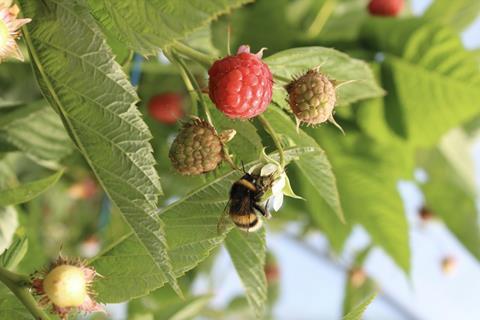New report covering over half of UK berry production reveals 100 per cent of growers monitor water quality, 96 per cent record carbon footprint data, and two-thirds of crop protection spending now focuses on biologicals and biopesticides

British Berry Growers (BBG), the organisation representing 95 per cent of the UK’s commercial soft fruit growers, has today (25 September) published its Sustainability Report 2025.
According to BBG, the report showcases how the industry is leading the way in sustainable farming practices while continuing to supply healthy, homegrown berries to the nation.
Compiled by Collison & Associates and based on a comprehensive survey covering over half of the UK’s total berry production, the report details how British berry farms are ”delivering world-leading sustainability gains” across ten key themes including water stewardship, carbon reduction, biodiversity, waste minimisation and digital innovation.
“Ethical and sustainable farming practices are at the heart of British berry production,” said Dr Louise Sutherland, director of research and development for British Berry Growers. ”This report shows our growers are innovating and investing at every stage to deliver healthy berries responsibly and sustainably.”
On water stewardship, the report found that 100 per cent of growers monitor water quality and have water efficiency plans.
Some 61 per cent have on-farm reservoirs or rainwater stores, with some meeting 100 per cent of their needs from captured rainwater, and 65 per cent of growers have reduced their overall water use in the last three years by an average of 16 per cent.
In the carbon and energy section, the report showed that 96 per cent of growers record data to calculate carbon footprints, 70 per cent have already implemented reduction actions, and 61 per cent have plans for further cuts.
There is a rapid uptake of renewable energy and precision irrigation is reducing emissions and energy use, it said.
For crop protection and biodiversity, nearly two-thirds of crop protection spending is now on biologicals and biopesticides, growers confirmed.
Meanwhile, 100 per cent of growers support biodiversity, with 96 per cent planting wildflower strips and 61 per cent creating wetlands or ponds for wildlife.
Growers are paying greater attention to the circular economy, with 96 per cent cutting plastic use and 78 per cent recycling tunnel films.
In addition, 74 per cent of respondents have reduced the weight of plastic punnets, with plastic-free alternatives are emerging.
Finally, on innovation and technology, some 91 per cent of growers have adopted digital systems such as AI-driven monitoring, decision-support tools and automation.
New plant breeding programmes are developing resilient and sustainable berry varieties, the study noted.
Having grown by 78 per cent since 2012, the British berry sector’s expansion has slowed due to rising costs and external pressures, but, as the report demonstrates, growers continue to invest in sustainability as a route to long-term resilience.
“British berries are among the most sustainable and nutritious fruits we can eat,” said Nick Marston, executive chair of British Berry Growers.
”As the UK tackles climate change and poor nutrition, supporting homegrown berry production has never been more important.”



